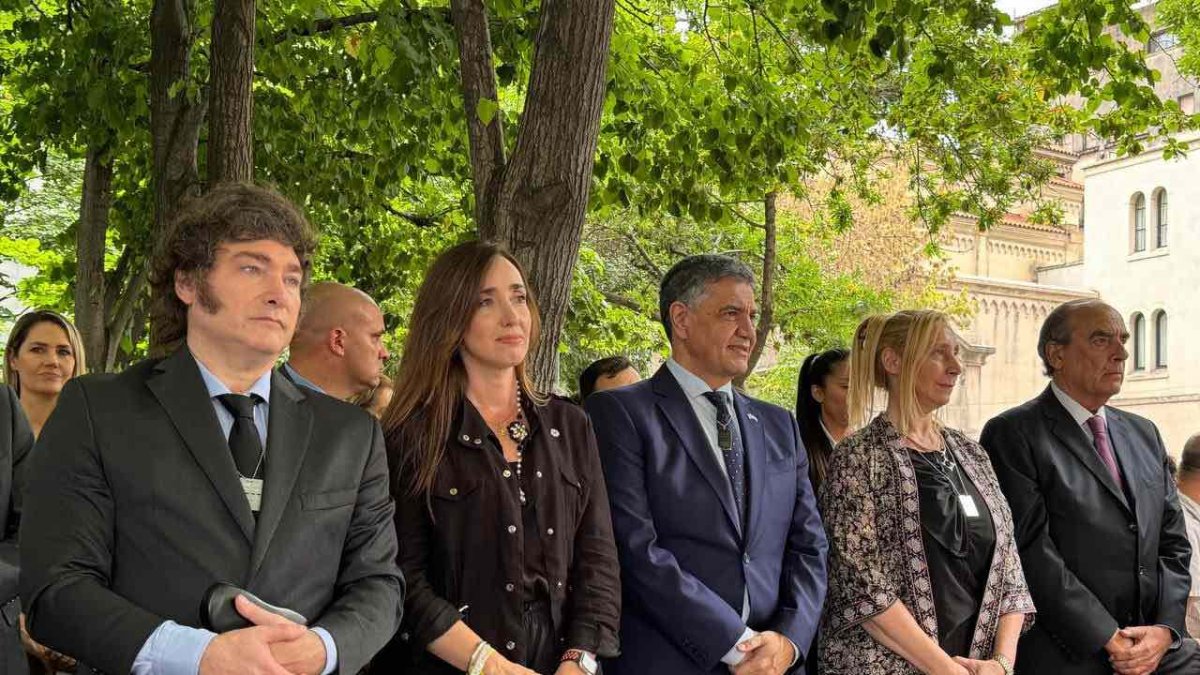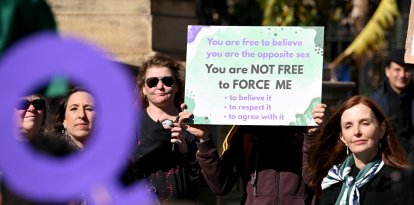Attack on the Israeli embassy in Argentina: 32 years of impunity
President Javier Milei attended the event in tribute to the victims of the terrorist attack that still remains unpunished.

Attack on the Israeli embassy in Argentina: 32 years of impunity
It has been 32 years since the attack on the Israeli embassy in Buenos Aires, Argentina. The bomb, which exploded in 1992, killing 29 people and injuring another 242, still resonates in the country due to the fact that the cowardly attack perpetrated by Islamic terrorists remains unpunished. Two years later, another attack occurred in the Argentine capital against the AMIA (Asociación Mutual Israelita Argentina), which left 85 dead.
Like every year, an event was held to honor the victims of the terrorist attack and to demand justice, in the place where the diplomatic headquarters of the Jewish state is located, in the city of Buenos Aires.
Even President Javier Milei and Vice President Victoria Villarruel attended the event, along with several cabinet members, Buenos Aires Mayor Jorge Macri, Israeli Ambassador Eyal Sela, Argentine Ambassador to Israel Shimon Axel Wahnish, survivors and relatives of victims of the attack and loved ones of Argentine-Israelis who are still being held captive by Hamas in Gaza, among others.
During his speech, Ambassador Sela expressed: “32 years ago, Hezbollah destroyed this building and spread terror. Two years later, Iran once again planned another attack that ended the AMIA.”
He further added, “Just a few months ago, Hamas entered Israel and once again wrote in blood the history of dozens of Argentines who were murdered or kidnapped. The Cúneo and Bibas families are hostages of Hamas. ... Argentines and Israelis are merged again in this pain.”
Attending the event is an important gesture by President Milei, who has expressed his support for Israel on repeated occasions and has spoken out against the Islamist terrorism that Argentina has also suffered.
'There may be another attack'
In conversation with Voz Media, Natalio Steiner, a graduate in Judaic sciences and international analyst, referred to the lack of justice after 32 years of the attack. “Impunity finds quite strong causes in the terrible investigation carried out by the Argentine government at that time, as well as in the Supreme Court of Justice, which had to investigate and promote the investigation.”
And he added: “Very little was done, beyond some substantial things that were basically known. In fact, that is the reason why we have no detainees. It has not been possible to advance much further due to the denial of justice, which implied that an Argentine government did not want to investigate its own services, its own police, those who needed to be investigated. As time went by, this was consolidated and found the icing on the cake, so to speak, in the attack against the AMIA. Therefore, if the first was not clarified, why would the second be clarified? The two are concatenated: they have similar ideological authorities, there are similar modus operandi and they have been carried out in a country where we know perfectly well that the justice system does not have resources and is not trained.. All this generated impunity for 32 years.”
“I would add one more piece of information,” the analyst continued, “the intimidation of Islamist terrorism. If we see what happened to Alberto Nisman, the prosecutor who investigated the attack on the AMIA and was murdered in January 2015, we realize that messing with these people is very dangerous and not only in this country, but in other places. ... There have been some attacks against judges and authorities that basically challenge the power of terrorism.”
Regarding responsibilities for the attack, Steiner maintained that "with the elements that are in the file, although there are not many, it is confirmed that the Islamic Jihad and Hezbollah were the authors." Furthermore, he clarified, "We must not only look at the traces of what has been found here, but we must compare it with other similar events that have taken place in a certain period in which Iran had a very large international activity related with the promotion of terrorist attacks. There were similar attacks in Germany, France and Austria, not against embassies or community headquarters, but against opponents of the Iranian regime. Car bombs were also used in Georgia and India, among other places.”
Likewise, Steiner added: “You see Hezbollah's modus operandi; one sees the way in which this terrorist organization raises money on the triple border [between Argentina, Brazil and Paraguay]; one sees the names that appear in different cases and in different places in the world, such as the name of Imad Mugniyeh, head of Hezbollah's Special Services who was eliminated by Israel in 2008. He appears repeatedly in 1983 in Lebanon and then in the files of the attacks on the Israeli embassy and the AMIA. ... He was the main person responsible for carrying out these attacks."
Regarding the Argentine government's support for the cause, the analyst maintained, “The people who have to investigate will feel more supported because whoever is in power is close to the victims and not the perpetrators. This can be an important element to advance the investigation.”
However, after so many years without justice, Steiner is not optimistic. “32 years in the case of the embassy and almost 30 in that of the AMIA is a long time. It is very difficult to reach an absolute truth when evidence has been erased, there have been cover-ups, both by the government of Carlos Menem and that of Cristina Kirchner. The Memorandum of Understanding signed by Cristina's government with Iran was a model of cover-up. All this sadness generates a lot of skepticism regarding these attacks being clarified."
Steiner also referred to the possibility that another attack of this type could occur in Argentina or in the region, especially taking into account the terrorist activity at the triple border shared by Argentina, Paraguay and Brazil. “There can be an attack of this or lesser magnitude in any circumstance that is conducive to those who manage terrorism at an international level, coming from the Shiite branch of Iran. In recent times we have already had some events that draw our attention on the American continent. In Brazil, a few months ago, a Hezbollah gang that wanted to attack Jewish community centers and other non-Jewish ones was dismantled. In Peru, an Iranian was arrested who wanted to attack an Israeli Jewish businessman. A few days ago, a member of Hezbollah who wanted to enter the latter country to organize a branch or a cell was detained on the border between Mexico and the United States."
The analyst warned, “Terrorism is active, it is latent, and much more so in Latin America where it has ideological partners, such as the extreme left sectors, who have a sinister alliance, and who see in the fight against terrorism a kind of revolutionary struggle as in the Guevarist era. The terrorism of Che Guevara's time has no relationship with what we are seeing now, which is fundamentalist, extremist terrorism of an anti-Western, anti-Israeli, anti-North American and anti-British model that hides behind other causes."
Steiner concluded, “There may be another attack because the conditions are in place for this type of thing to happen, with emerging governments with weak border structures and precarious security systems. As long as there is no greater international collaboration, naturally this will advance and can happen. This is a constant and permanent struggle. But as long as the financial circuit is not cut and there are no more punitive measures against Iran, obviously terrorism will find fertile ground to continue acting.”

























